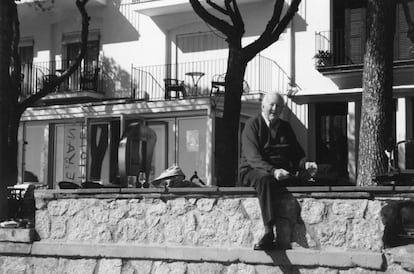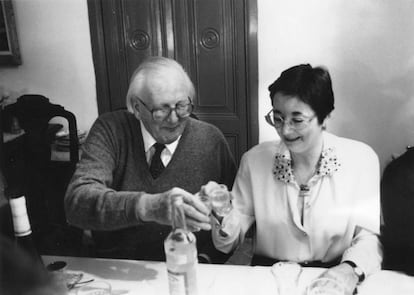Tom Sharpe: A Nazi father, beatings, sexual repression and a final idyll in Catalonia
A new biography of the British satirist explores the controversial and complex figure of the creator of ‘Wilt’ on the 10th anniversary of his death on the Costa Brava


In 2008, the year he turned 80, Tom Sharpe, one of the most famous satirists in British literature, received an offer for his autobiography that he could not refuse. “I’ll write it,” he told Montserrat Verdaguer, his future executor, in the Catalonian town of Llafranc on the Costa Brava. “A million pounds is a lot of money. I don’t give a damn about my father! He was a Nazi; I’m not,” he also told his sentimental partner. The writer had been taking notes for years and wondering if he should produce an account of his life, but he told himself repeatedly not to even consider it. He feared what would happen to him, his public image, and his work, if he ever did. Was a million pounds going to change any of that? No. Before long, he was telling Verdaguer the exact opposite, in a clear display of his ardently childish and impulsive character. “I can’t write my autobiography; my life has been awful [...] You will write my biography when I am dead. You’ll have a huge job, but you’ll make a fortune,” he blurted out.
The unwanted son of an extravagant couple, Sharpe felt neglected as a child. His father was a charismatic Unitarian minister; his mother, the daughter of a wealthy South African businessman. By the time he was born, both were so old that they could have been his grandparents. They tried to get rid of him on more than one occasion: she played jump rope while she pregnant and he gave him at least one defective gun with which he could have killed himself. The writer spent his childhood in a boarding school where he was brutally beaten, and in the homes of families who took care of him, always treating him as a passing stranger. And yet, his fascination for his father was such that the first thing the aspiring writer wanted to be was an SS general: “My father was much more of a Nazi than I ever admitted. He was an extreme Nazi,” he confessed to Verdaguer when he began to dictate his memories, something he did daily from 2001 until the day of his death in 2013.

Disoriented and immersed in a paralyzing creative crisis, convinced that he had lost his narrative punch forever, Sharpe arrived in Llafranc, the small Catalan town he would never again leave, in 1992. At the time, he was looking for hotels where he could stay for extended periods of time to try to regain his inspiration. In Llafranc he came across the modest Hotel Llevant, a low building with few rooms, facing the sea. Initially he stayed there as a guest and after he had acquired a house in Llafranc, he began to spend a good part of the day there as a visitor. Llafranc, he said, “was love at first sight.” It was at the Llevant — now converted into a luxurious boutique hotel called Isabella’s Llafranc — where Miquel Martín i Serra, the narrator whom Verdaguer finally commissioned to write Sharpe’s controversial biography, says that: “The pathos of the characters he created takes on another meaning after you understand what his life was like, as does the fun in his books.”
For Martín i Serra, author of Fragmentos de inexistencia (or, Fragments of non-existence), the biography in question, “there is a lot of sadness” in Sharpe’s work, hidden at first glance, thanks to his fierce satire and his ability to squeeze absurdity and ridiculousness out of what is otherwise terrifying. A famous example is when during his time in apartheid-era South Africa — where he settled after a fateful stint in the army, and where he began writing poetry and theater, earning his living as a photographer and social worker — he heard about a friend’s aunt, who lived near a police station, complaining that the sounds of prisoners being tortured was interrupting her afternoon naps. “She wasn’t complaining about the torture; she was complaining about the noise. Sharpe found it terrifying. And he realized that if he wanted to denounce that in any way, he was going to have to use absurdity. Because it would not have been credible in a serious novel,” says Martín i Serra.

After a brief childhood fascination with Nazism, Sharpe never recovered from the horror he felt at discovering what had happened in the concentration camps, hence his “moral sadomasochism,” in the words of Martín i Serra. He could not understand his father, or forgive him. “He wanted to be a good person above all else,” says his biographer, but he was burdened with a past that disgusted him and weighed heavily on him. “He was contradictory to absurd extremes. He had an explosive personality. He was impulsive and impetuous. And he couldn’t help being the center of attention. Everything always had to revolve around him, but at the same time, as he said, he was arrogantly humble,” says Martín i Serra, who delved into six decades’ worth of personal diaries and Sharpe’s varied and rich correspondence — as well as the transcripts from 12 years of conversations with Verdaguer — to bring Sharpe back, and with him his hypochondria and fear of sex.
The conflicted relationship of Henry Wilt, the protagonist of five of his most popular novels and television adaptations, with sex and the prophylactic — the infamous blow-up doll — comes from Sharpe himself. He had an almost childish relationship, of disgust and inevitable desire, with the act in question. He described the female organ as ugly and, also, that sex was no big deal. “That explains why the women in his novels are man-eaters,” says the biographer. He feared them. He preferred to do it alone. And he had something of an obsession with rubber, linked to a childhood trauma — a tonsil operation that involved wearing a prophylactic mask — that is a distorted theme in his stories. Condoms, which his mother considered “almost demonic” objects, are everywhere in his work, in which they “come to acquire almost supernatural powers.”

Lonely, unpredictable, and as deeply misunderstood as his alter ego, and his alter ego’s wife — part of Eva Wilt’s character is also Sharpe’s, and her passion for botany was also his, as the only thing that could bring him closer to his father — Sharpe did not publish his first novel, Riotous Assembly, until he was 41. But he found in his formula, inspired by his adored Evelyn Waugh and P. G. Wodehouse, a way to “cry out against an irascible and fascist father, an absent and distant mother, against the snobbery of Cambridge and the classism of England, against apartheid and against his job as a teacher that, for so many years, had not allowed him to write,” says Martín i Serra. “His life was a constant mixture of war and peace,” adds the biographer, sitting on the terrace of the hotel where a part of Sharpe himself will remain forever.
Sign up for our weekly newsletter to get more English-language news coverage from EL PAÍS USA Edition
Tu suscripción se está usando en otro dispositivo
¿Quieres añadir otro usuario a tu suscripción?
Si continúas leyendo en este dispositivo, no se podrá leer en el otro.
FlechaTu suscripción se está usando en otro dispositivo y solo puedes acceder a EL PAÍS desde un dispositivo a la vez.
Si quieres compartir tu cuenta, cambia tu suscripción a la modalidad Premium, así podrás añadir otro usuario. Cada uno accederá con su propia cuenta de email, lo que os permitirá personalizar vuestra experiencia en EL PAÍS.
¿Tienes una suscripción de empresa? Accede aquí para contratar más cuentas.
En el caso de no saber quién está usando tu cuenta, te recomendamos cambiar tu contraseña aquí.
Si decides continuar compartiendo tu cuenta, este mensaje se mostrará en tu dispositivo y en el de la otra persona que está usando tu cuenta de forma indefinida, afectando a tu experiencia de lectura. Puedes consultar aquí los términos y condiciones de la suscripción digital.








































